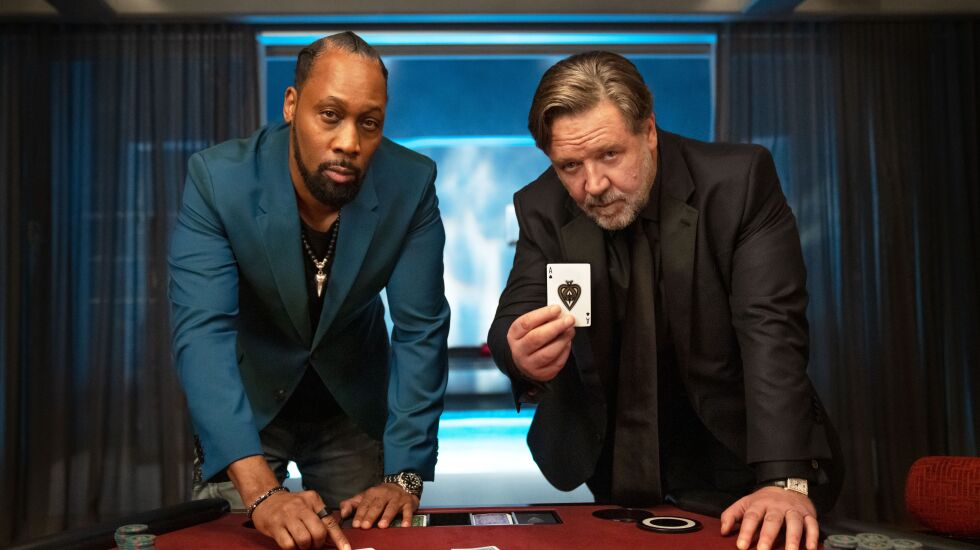
In the nearly 25 years since the release of the best poker movie of all time in “Rounders,” it’s been mostly busted flushes and missed straights at the table, with a few exceptions such as “Molly’s Game” (2017) and the Texas Hold’em scene in “Casino Royale” (2007), which was ludicrous in terms of the hands that were dealt but was wildly entertaining nonetheless.
So, as a poker enthusiast, I was pretty hyped for “Poker Face,” with Russell Crowe directing, co-writing and starring in the story of a tech billionaire and professional gambler who gathers his best friends for a night of high-stakes poker. Sure enough, after a prologue set during the childhood days of the main character and his friends, and a few other sequences (some of which turn out to have little to do with the main story), Crowe’s Jake Foley welcomes his closest friends to his palatial retreat, invites them to sample the high-end wines, whiskeys and cigars — and they all sit down to play some cards. I mean, we’re nearly 40 minutes into the slow-moving set-up, but here we go. Excellent!
The game is Texas Hold’em, winner take all, and on the very first hand, two of the players go all in, meaning they’ve risked their entire stacks of chips and whoever loses will be out of the game. Turns out they both have straight and flush draws and neither hits — so they split the pot. It’s the very definition of an anti-climactic “river card.”
It’s also the last time we see an actual hand played out in “Poker Face,” which turns out not to be a poker movie at all, but a slick and meandering heist movie and psychological thriller with an increasingly implausible plot that flies completely off the rails in the final sequences. Crowe retains his movie star power and commanding onscreen presence, and has solid directorial skills, but the supporting characters are thinly drawn, and the overall story is half-baked at best. Time and again, there’s a Big Reveal followed by an even Bigger Reveal, but little of it feels authentic or organic to the plot.
In a voiceover, Crowe explains how he and his best friends from childhood loved playing any type of poker. “When the first personal computers came along … in ’94, we set up the world’s first online poker system … [and] by restructuring the code from cards to countries, [we] retooled the program into a salable military grade surveillance software. We called it ‘Riffle.’ … Our customers are governments.” And that’s how Jake got so rich he tools around in a Rolls Royce and carries a leather case with a dozen Rolexes he can switch out at any time.
Still, Jake moves through life with an air of restless melancholy about him, in part because his first wife died, though he is grateful for his loving second wife (Brooke Satchwell) and his adoring teenage daughter (Molly Grace). Jake has recently received some alarming news about his own health and he needs to settle a number of matters with his best buddies, so he invites them to the poker game and gives each $5 million in chips — but they have to risk the entire stack in the game, and it’s winner take all.
Enter Alex (Aden Young), a successful author; Paul (Steve Bastoni), a government official; Mike (Liam Hemsworth), who’s struggling with addiction, and eventually Jake’s business partner Drew (RZA). They’re each harboring secrets and there is much tension to be resolved — but wait a minute, a band of thieves led by the ruthless and unhinged Victor (Paul Tassone) has broken into the house with the intent of stealing some of Jake’s valuable artwork.
Complicating matters further, Jake’s wife and daughter have discovered that terrible news about Jake’s health, so they decide to make an unexpected visit, just in time for Victor to grab them and hold them hostage while Jake and his buddies try to map out a plan while ensconced in a Panic Room. Looks like the bleep is about to hit the fan, and they’re never going to get back to that poker game.
“Poker Face” has a lean, cool look, and there are some effective dramatic moments, mostly due to the weight-of-the-old weariness in Crowe’s powerful performance. Unfortunately, Paul Tassone’s over-the-top theatrics as the main villain border on the cartoonish, as the psychological gamesmanship gives way to standard action movie stuff, and the cards and the chips have long been forgotten.







